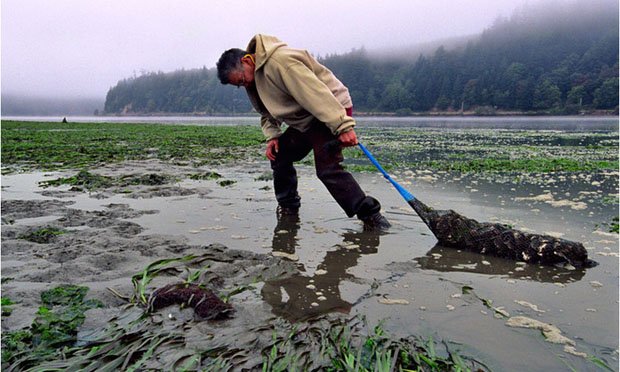Human activity has negatively affected animal populations on land for tens of thousands of years, with numerous instances where unsustainable hunting practices or deliberate, widespread acts of eradication have led to what scientists call “defaunation” — the human-caused global extinction of a species.
The International Union for Conservation of Nature (IUCN) has found that since the year 1500, human activity has cause the extinction of 514 animal species — from the passenger pigeon and thylacine to the great auk and the quagga. Despite extensive overfishing and pervasive water pollution, marine animals have fared better, with only 15 known human-caused global extinctions over the past 500 years. This may be changing, however: Many species have become “locally extinct” in particular ocean habitats, the Chinese river dolphin is now thought to be “functionally extinct” and many more are threatened, including species of sharks, rays, turtles and whales.
Rising ocean temperatures because of human-induced climate change increasingly imperil many ocean creatures. This dynamic is contributing to a set of geochemical changes in the oceans called acidification, which is happening faster than at any time in the past 300 million years, according to a 2012 paper published in the journal Science. Separate analyses from NASA and the National Oceanic and Atmospheric Administration (NOAA) note that land and ocean temperatures globally in 2014 were the hottest since records began to be kept in 1880. Further, human changes of all kinds can interact to destroy vital habitat, with coral reefs contracting and becoming bleached at alarming rates, for example.
A 2015 research review published in the journal Science, “Marine Defaunation: Animal Loss in the Global Ocean,” suggests because of the oceanic impacts of global warming, we could be facing a sweeping loss of species in the near future. The researchers — Douglas J. McCauley, Francis H. Joyce and Robert R. Warner, all at U.C. Santa Barbara; Malin L. Pinsky of Rutgers; Stephen R. Palumbi of Stanford; and James A. Estes of UC Santa Cruz — note that there are three additional types of extinctions below the category of total global loss: local habitat extinctions, where a species permanently dies in one location but survives in others; ecological extinctions, where populations still exist but the species no longer plays its normal, evolved role in the environment; and commercial extinctions, whereby fishing and harvesting is no longer viable because of population decline.
Key points in the study include:
- “Marine extinction rates today look similar to the moderate levels of terrestrial extinction observed before the industrial revolution…. Rates of extinction on land increased dramatically after this period, and we may now be sitting at the precipice of a similar extinction transition in the oceans.”
- “Aggregated population trend data suggest that in the last four decades, marine vertebrates (fish, seabirds, sea turtles and marine mammals) have declined in abundance by on average 22%. Marine fishes have declined in aggregate by 38%, and certain baleen whales by 80% to 90%.”
- “Marine defaunation is already affecting human well-being in numerous ways by imperiling food sustainability, increasing social conflict, impairing storm protection, and reducing flows of other ecosystem services…. According to the U.N. Food and Agriculture Organization (FAO), 40 times more wild animal biomass is harvested from the oceans than from land.”
- Human-induced climate change can be expected to continue to have deleterious effects: “The effects of rising ocean temperature extend well beyond coral reefs and are predicted to affect both the adult and juvenile stages of a diverse set of marine species, to reshuffle marine community composition, and to potentially alter the overall structure and dynamics of entire marine faunal communities.”
“We are not necessarily doomed to helplessly recapitulate the defaunation processes observed on land in the oceans: intensifying marine hunting until it becomes untenable and then embarking on an era of large-scale marine habitat modification,” the researchers conclude. “However, if these actions move forward in tandem, we may finally trigger a wave of marine extinctions of the same intensity as that observed on land. Efforts to slow climate change, rebuild affected animal populations and intelligently engage the coming wave of new marine development activities will all help to change the present course of marine defaunation.”
Keywords: oceans, water, marine life


Expert Commentary